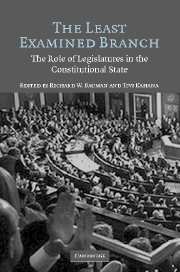Book contents
- Frontmatter
- Contents
- Foreword: Legislatures in the Constitutional State by Amy Gutmann
- Contributors
- New Ways of Looking at Old Institutions
- PART ONE LEGISLATURES AND DEMOCRATIC THEORY
- PART TWO LEGISLATING AND DELIBERATING IN THE DEMOCRATIC LEGISLATURE
- PART THREE CONSTITUTION MAKING BY LEGISLATURES: THE EXPLICIT VERSION
- PART FOUR CONSTITUTION MAKING BY LEGISLATURES: THE IMPLICIT VERSION
- PART FIVE CONSTITUTIONAL INTERPRETATION AND APPLICATION BY THE LEGISLATURE
- PART SIX IS LEGISLATIVE CONSTITUTIONALISM POSSIBLE?
- 20 Democratic Decision Making as the First Principle of Contemporary Constitutionalism
- 21 Legislative Constitutionalism in a System of Judicial Supremacy
- 22 Between Supremacy and Exclusivity
- 23 Legislatures as Rule-Followers
- 24 Popular Revolution or Popular Constitutionalism? Reflections on the Constitutional Politics of Quebec Secession
- PART SEVEN THE LEGISLATURE IN DIALOGUE: DOMESTIC AND INTERNATIONAL CONTEXTS
- Index
24 - Popular Revolution or Popular Constitutionalism? Reflections on the Constitutional Politics of Quebec Secession
Published online by Cambridge University Press: 06 August 2009
- Frontmatter
- Contents
- Foreword: Legislatures in the Constitutional State by Amy Gutmann
- Contributors
- New Ways of Looking at Old Institutions
- PART ONE LEGISLATURES AND DEMOCRATIC THEORY
- PART TWO LEGISLATING AND DELIBERATING IN THE DEMOCRATIC LEGISLATURE
- PART THREE CONSTITUTION MAKING BY LEGISLATURES: THE EXPLICIT VERSION
- PART FOUR CONSTITUTION MAKING BY LEGISLATURES: THE IMPLICIT VERSION
- PART FIVE CONSTITUTIONAL INTERPRETATION AND APPLICATION BY THE LEGISLATURE
- PART SIX IS LEGISLATIVE CONSTITUTIONALISM POSSIBLE?
- 20 Democratic Decision Making as the First Principle of Contemporary Constitutionalism
- 21 Legislative Constitutionalism in a System of Judicial Supremacy
- 22 Between Supremacy and Exclusivity
- 23 Legislatures as Rule-Followers
- 24 Popular Revolution or Popular Constitutionalism? Reflections on the Constitutional Politics of Quebec Secession
- PART SEVEN THE LEGISLATURE IN DIALOGUE: DOMESTIC AND INTERNATIONAL CONTEXTS
- Index
Summary
TWO CONCEPTIONS OF CONSTITUTIONALISM
Constitutional theorists are in the midst of a debate over the appropriate institutional arrangements for the interpretation and enforcement of constitutional norms in a constitutional democracy – that is, a liberal democratic polity in which all exercises of public power must comply with some higher-order or basic law. In the United States, Larry Kramer has usefully described the two extreme positions in this debate as “legal constitutionalism” and “popular constitutionalism.” For legal constitutionalists, supreme authority to interpret and enforce the constitution rests with the courts. Because court judgments are regarded as authoritative by other government institutions and, indeed, by the public, these political actors defer to judicial pronouncements in the face of their own conflicting constitutional interpretations. Popular constitutionalists, by contrast, permit and even require that members of the executive and legislative branches independently interpret the constitution alongside the courts in the course of performing their functions. Moreover, these branches are ultimately subject to the “active and ongoing control over the interpretation and enforcement of constitutional law” by the people themselves, “conceived as a collective body capable of independent action and expression.” Institutionally, although popular constitutionalists may accept the possibility of judicial review, they refuse to accept judicial supremacy.
As Frederick Schauer has insightfully suggested, it is possible to understand this debate over institutional design as turning on different underlying conceptions of the point and function of constitutions themselves.
- Type
- Chapter
- Information
- The Least Examined BranchThe Role of Legislatures in the Constitutional State, pp. 480 - 498Publisher: Cambridge University PressPrint publication year: 2006
- 1
- Cited by



